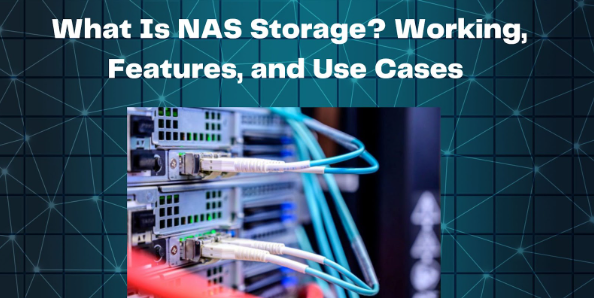Introduction:
Network Attached Storage (NAS) is a type of storage device that can be accessed and shared over a network or the internet. It provides users with an efficient, cost-effective way to store and access files. NAS devices are often used by organisations or individuals who need to securely store large amounts of data in a networked environment. So, what is NAS storage? Let’s dive in and explore its features, workings, and use cases.
How Does NAS Work?
NAS works by connecting directly to the server or router on a local area network (LAN). The connection between the NAS and the router allows for fast file transfers among multiple computers connected to the same LAN. Furthermore, NAS devices can also be set up with internet access, allowing users to share and access files from anywhere with an internet connection.
Features of NAS Storage
The primary feature of NAS storage is its ability to provide easy access for multiple users across different platforms. Other features include:
-Data encryption and backup capabilities – A good quality NAS device should have data encryption as well as backup capabilities so that all your important data remains safe even if there’s an unforeseen system failure or power outage.
-Network security – The data stored on your NAS will be secure since it’s only accessible through your own private network. This means that you don’t have to worry about hackers trying to gain access to your information.
-High scalability – If you need more space than what your current device offers, most NAS devices allow you to expand the capacity easily by adding additional hard drives or expanding RAID configurations.
-Ease of use – Many modern devices come with user-friendly interfaces that make setting up your own private cloud storage easy and straightforward enough for even novice users.
Use Cases for Network Attached Storage
Network attached storage can be used in many different types of environments including businesses, homes, universities, hospitals, etc., but here are some specific use cases for how it can be utilized:
-Small Businesses – Small businesses often need fast access to large amounts of data stored on their servers without having to maintain physical servers themselves. With a good quality NAS device they can quickly upload/download large files without any latency issues while keeping their data secure from external threats.
-Home Theater Systems – Home theater systems often require large amounts of capacity in order for them to store media such as movies or music collections that otherwise may not fit on conventional hard drives or USB sticks due to their size constraints. By using a high-capacity NAS storage solutions device they can easily stream content across multiple connected devices simultaneously without any slowdown issues or buffering timeouts.
-Media Production Studios – Media production studios require lots of space in order for them to process video/audio projects efficiently without running into any storage limitations during production cycles which could potentially slow down workflow times dramatically when dealing with large files such as 4K videos which usually take up lots of space once encoded properly into digital formats compatible with both web streaming services such as Netflix as well as physical media like Blu-Ray discs etc…
NAS Storage use cases
NAS Storage solutions systems have become increasingly popular for various use cases due to their ability to provide reliable storage solutions at an affordable cost. NAS storage is ideal for small or medium businesses, as well as freelance or creative workers like photographers, videographers, and other creatives who benefit from having archive-ready access to large collections of media files. In a corporate environment, NAS storage can be used to store employee documents and other valuable business data that needs to be easily accessible and secure. Furthermore, NAS Storage can enable multiple users to collaborate simultaneously on larger projects with faster speed than traditional methods. Overall, nas storage offers an array of uses that make it an efficient tool for all types of users.
Conclusion:
All in all, Network Attached Storage offers many advantages over traditional forms of file sharing due its fast speeds, low latency times, scalability options and overall ease of use compared to other cloud storage solutions available on the market today making it an attractive option especially amongst small businesses who want quick access times combined with robust security measures at a fraction of the cost compared other cloud service providers out there contact StoneFly today!




